Sergei Prokofiev in/at the Movies
Diary Notes and One Letter, 1930
Sergei Prokofiev (translated by Maria Vinogradova)
Dnevnik: 1907-1933, vol. 3 (1926-1933)
Below is a selection of personal documents pertaining to Sergei Prokofiev’s home movie making activities and to the broader experience of cinema in his daily life. They include a selection of notes from his diary and one personal letter, all written between September and December of 1930. A full list of names mentioned in these materials is appended.1
September 1, diary note
Meyerhold was telling me that “proletarian musicians” at the Bolshoi Theatre had not only been inveighing against The Leap of Steel but also organized a formal attack against me within the walls of the Moscow Conservatory. There were all sorts of tirades against me in their bulletin. And what of Przybyszewski who came across as friendly when I was in Moscow?
We bought a small movie camera and decided to have our first shoot today. Zinaida Nikolaevna came up with a scenario: Ptashka’s [Lina Prokofiev’s]child is kidnaped by the bandit Meyerhold who hides him in a basement (for which there happened to be a picturesque descent to the well). A chase begins. And here Ptashka suddenly wakes up – all of this was just a dream. We were “staging” the film for the whole day, got terribly carried away, got excited, argued. When, at the end, the children were bathed, Meyerhold tied a rope to a branch and waved it in the foreground, right in front of the movie camera, so that it would be “poetic,” as if it was in the wind.
September 2, diary note
We drove to Paris: the Meyerholds had errands to run there, and so did we; besides, I took my film to the lab, and I had to pick up Wittgenstein who was arriving in Paris. The latter turned out to be a young man, rather gaunt, but lively. I persuaded him to go to our place in the village and play music there. He eagerly agreed, but made a wry face as he found out that Meyerhold was coming along: he “can’t stand the Bolsheviks.” I was explaining to him in every way I could that Meyerhold, before anything, is a remarkable artist, and if he is also a distinguished Red Army officer, this is mainly so that no one would interfere with his theatre work. At last we went peacefully all together, came to La Naze2 for lunch during which Wittgenstein was very skillful with his left hand. Astrov, who was totally shocked that there are people who are willing to pay 125 francs for a concerto, was disappointed with Wittgenstein’s gaunt appearance. Ptashka even got angry: “And what did you imagine, he would come in a tailcoat and with medals?” In the evening, I showed Wittgenstein two themes that could become parts of his concert; knowing, however, that they were not very simple, I warned him to listen to them several times before giving his judgement. But upon the first playing Wittgenstein shouted: “You can play them for two months I wouldn’t understand anything anyway.” After that he demonstrated his technique, or, more precisely, the technique adapted for pieces for the left hand alone: there were transcriptions of Chopin’s études, as well as of Mozart and even Puccini. I asked: “Look, what made you commission a concerto by me if that’s the kind of music you like?” He replied that he likes my piano devices and he hopes that I’ll be able to create a technically interesting piece. I began to question him in greater detail about his wishes, the concert’s form, its length, but he was reluctant to speak, apparently wishing to leave me complete freedom. Zinaida Nikolaevna and Ptashka, sitting in the corner and listening to him so lovingly playing with one hand, felt deep compassion towards him, reflecting that just such a man had been destined to lose his right arm in the war. But I told them: “I don’t see any special brilliance in his left hand; perhaps his misfortune turned out to be luck, since with his left hand he is, at least, unique, and had he had both, then he perhaps would not stand out among a crowd of mid-tier pianists.”
September 4, diary note
In the car, we drove to the city on our business. I was at Lifar’s; he handed me a thick wad of money: thirty thousand, the first advance for my ballet. Good of him to do so. Besides, I needed to pick up our developed film. Upon receiving it, we beheld: the pictures had come out clear, even though the first try is usually bound to be a flop. Impatiently we returned to La Naze, and here it turned out that Zinaida Nikolaevna, despite Ptashka’s attempts to persuade her, had already attempted to run the projector, which she had seen done in Moscow. Once she ran it, sparks crackled and everything stopped. I ran towards the device, and here it became clear that it was made for Parisian voltage – in La Naze it was twice as strong – so it required a transformer and thus she had burned the hell out of it. As I was fiddling in desperation with the device, Zinka slightly opened the door and asked, “May I?” I replied, “No, you may not!” Zinka got offended, went upstairs and did not come down for lunch, and I was telling Meyerhold angrily that one should not grab unknown devices, and now nothing is spinning and we are unable to see the film. Ptashka is saying that upstairs, Zinaida Nikolaevna was crying and swearing at me.
When children break a toy, they also bawl in frustration. However, I wasn’t any smarter, sitting sulking downstairs.
September 9, diary note
I was in Paris and brought Lifar, Nouvel, and Koribut. There was a pleasant whiff of Diaghilev’s atmosphere. At tea time we were shooting a film, but it was coming out silly: no one knew what to do – they were waving hands and taking off their hats, and Lifar, like a colt, jumped up to hug Ptashka.
I played an excerpt from the ballet and a quartet – everyone liked it. In the evening, they all left, although I was persuading them to stay overnight.
September 18, diary note
After four days of very pleasant village life at the Nabokovs’, on the eighteenth we turned back, taking Nika, who needed to go to Paris, with us. Our Chevrolet swiftly ascended the pass across the Vosges, where we had breakfast. Then, having stepped to the side, toward a cliff, we decided to swiftly act out a film we had just imagined.
The difficulty of this arrangement was that there were three characters: two were in frame, while the third (which we took turns playing) had to crank the camera. We came up with this: Ptashka is sitting pensively by the cliff, while Nabokov is strolling around and starting to bother her; Ptashka breaks away, runs to me to complain; I take a stick and head towards Nabokov, raise my hand, but… it turns out this fellow is my friend, we sit next to each other, start slapping each other on the knee and hug. While we were playing this out, faces appeared in the hotel windows, following us with curiosity, thinking we were the real cinéma. Then we rolled on and spent the night in the hometown of Joan of Arc.
September 28, diary note
Had a visit from Paichadze and the Samoilenkos. We went mushroom foraging, without much success.
We arranged a large film shoot, a whole drama with a Hindu in a turban (Paichadze), a villain (Samoilenko), and a detective (me) – and their ladies. We worked with enthusiasm. There were lots of fruits in the garden, which we went to pick during breaks in shooting.
October 8, letter to Ekaterina Ignat’eva (excerpt)3
Dear cousin,
I am sending you a few of our summer photographs. In addition to a photo camera, we also now have a small home cinématographe called Pathé Baby. And whenever friends or acquaintances came to our dacha, we act out detective dramas with them – it comes out funny; we also filmed our children in the act of devouring candy, and other such scenes. In the evenings we screen our films. From these reels we can select the best frames and blow them up, which will give us a collection of lively snapshots that I’ll eventually send to you.
November 12, diary note
Ptashka and I went to the movies. In one place a Chaplin film was accompanied by the March from Three Oranges.4
December 29, diary note
We are having a Christmas party: both children and grown-ups. Among the latter is the old lady Meindorff, whom I drove back and forth by car. The old lady is wonderful, fresh – she found something to talk about with everyone. I ran the cinematograph with our summer movies, which had greater success than those we rented.
* * *
People (in order of appearance)
Przybyszewski, Bolesław (1892 – 1937): Soviet musicologist of Polish origins, director of the Moscow Conservatory in 1929 – 1932.
Meyerhold, Vsevolod (1874 – 1940): Soviet avant-garde theatre director and actor, creator of the acting technique of biomechanics. An important mentor for Prokofiev. Second husband of Zinaida Raikh.
Raikh, Zinaida Nikolaevna, also Zinka (1894 – 1939): Soviet actress and star of the Meyerhold Theatre. Second wife of Vsevolod Meyerhold.
Ptashka (“Birdie”) – Lina Prokofieva, née Carolina (Lina) Codina (1897-1989): Spanish singer and the first wife of Sergei Prokofiev. Her stage name was Lina Llubera.
Wittgenstein, Paul (1887-1961): Austrian-American pianist who lost his right arm during World War I and subsequently developed unique techniques only playing with his left hand. Brother of philosopher Ludwig Witgenstein.
Astrov, Mikhail (1907 – 1996): Writer, descendant of music composer Cesare Puni, Prokofiev’s secretary in 1928-1934.
Lifar, Serge (1905 – 1986): Ukrainian ballet dancer and choreographer whose stage career began with Ballets Russes. One of the greatest male dancers of the 20th century.
Nouvel, Walter (1871–1949): Russian pianist and an active participant in the prominent “World of Art” circle, founded in the late 1890s by Sergei Diaghilev and Alexandre Benois.
Koribut, Pavel (1865 – 1940): Sergei Diaghilev’s cousin, close to the circle of Ballets Russes.
Diaghilev, Sergei (1872 – 1929): Legendary Russian impresario and founder of Ballets Russes. One of Prokofiev’s most important mentors.
Nabokov, Nicolas, also Nika (1903 – 1978): Russian-born composer and cousin of the writer Vladimir Nabokov, and a close friend of Sergei Prokofiev.
Paichadze, Gavriil (1883 – 1976): Russian-born music publisher and enthusiast active in various music and cultural organizations. Prokofiev’s publisher in Paris.
Samoilenko, Boris (ca. 1879 – 1936) and Fatima Khanum (189? – unknown): An elegant Parisian couple, formerly from Moscow, well-connected in artistic circles. Boris was Ukrainian and Fatima was Ossetian, originally from Baku. Сlose friends of Sergei and Lina Prokofiev.
Ignat’eva, Ekaterina, née Rayevskaya (1881 – 1943): Prokofiev’s cousin who he became close to during his St. Petersburg years. She was arrested on unclear charges in early 1928, and spent most of the rest of her life in exile in the small town of Kadnikov in Vologda Oblast.
1. All diary notes are quoted from Sergei Prokofiev, Dnevnik: 1907-1933, vol. 3 (1926-1933) (Moscow: Klassika XXI, 2017). For the initial research, the digitized online database of diaries, Prozhito, was extremely helpful: https://prozhito.org/person/175.↩
2. La Naze, Par Valmondois, is a village north of Paris where the Prokofievs were renting a summer home.↩
3. Quoted from Nataliia Savkina, “Kazhdaia shchastlivaiia sem’ia…,” in S.S. Prokofiev; K 125-letiiu so dnia rozhdeniia: pis’ma,dokumenty, stat’i, vospominannia, ed. Ekaterina Vlasova (Moscow: Kompozitor, 2016), 69-70. ↩
4. Prokofiev is referring to his operetta The Love for Three Oranges (1921). ↩
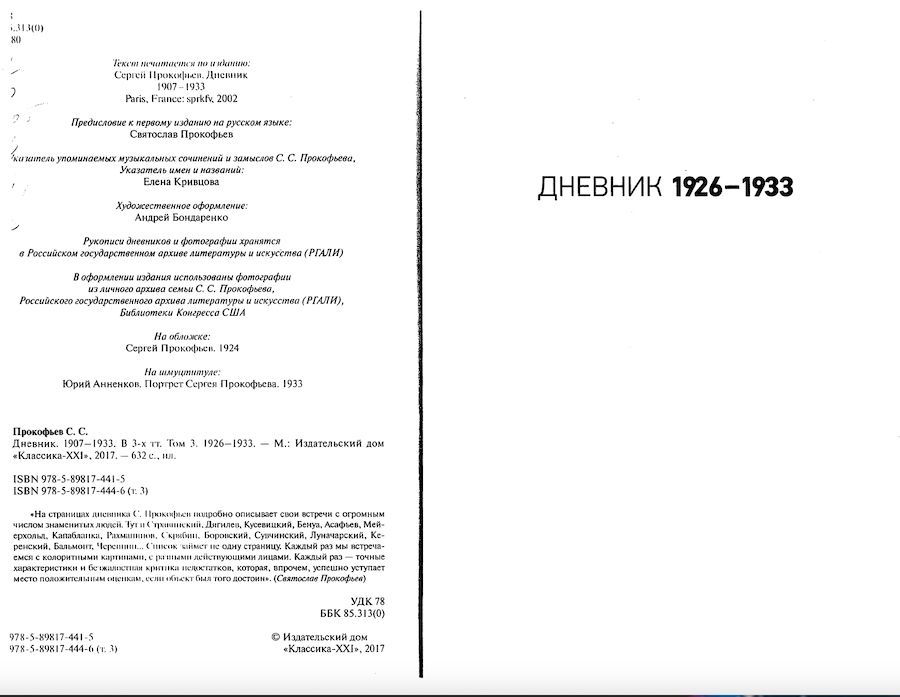
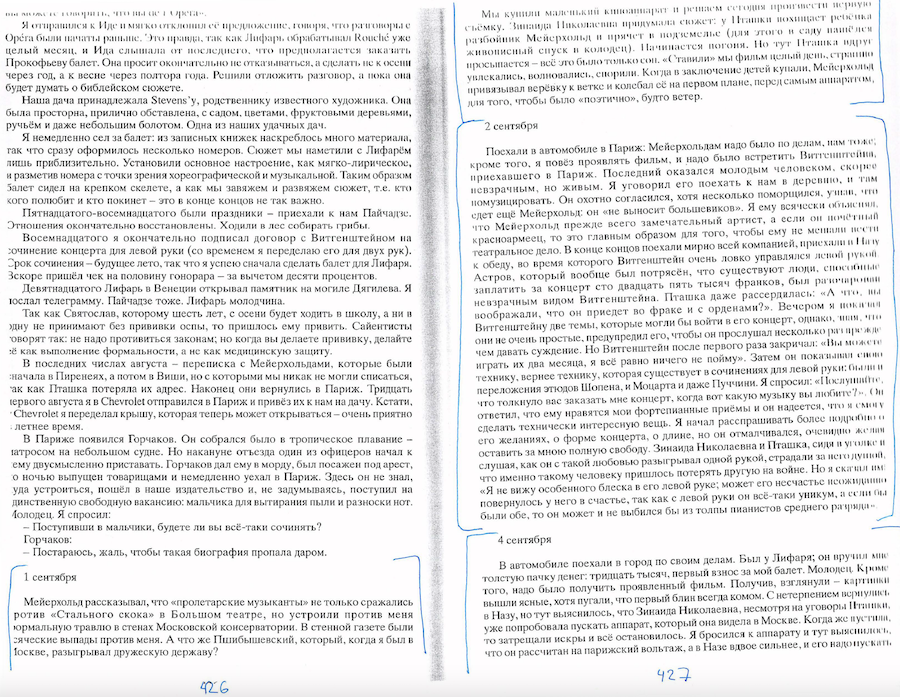
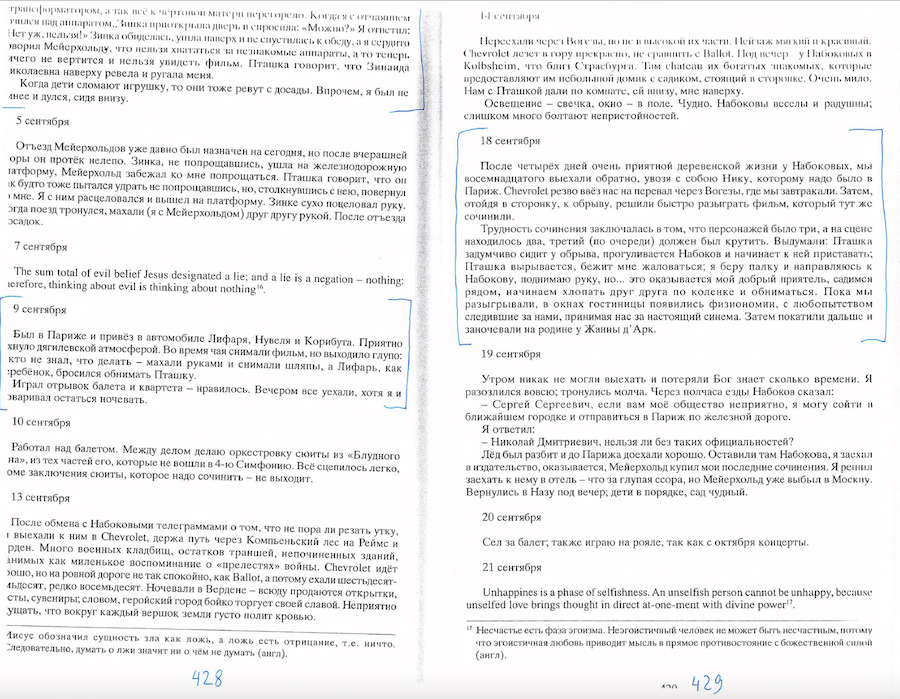
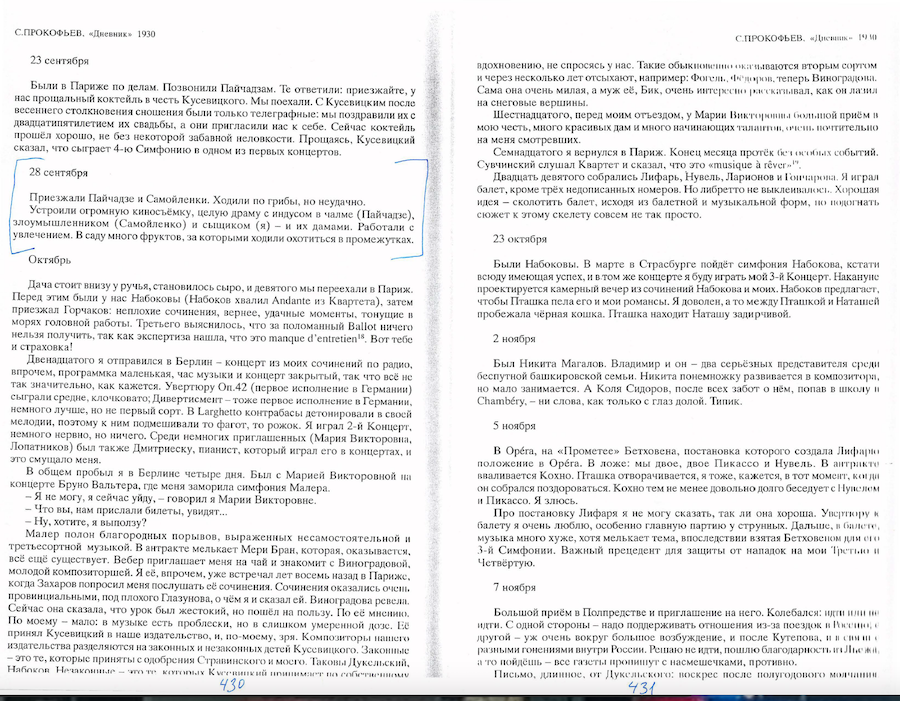
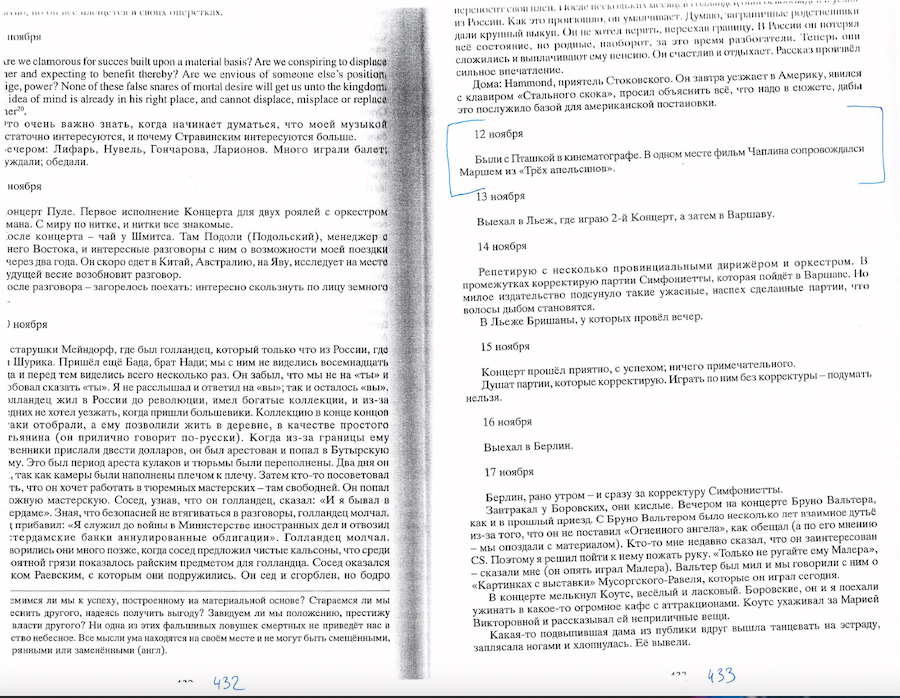
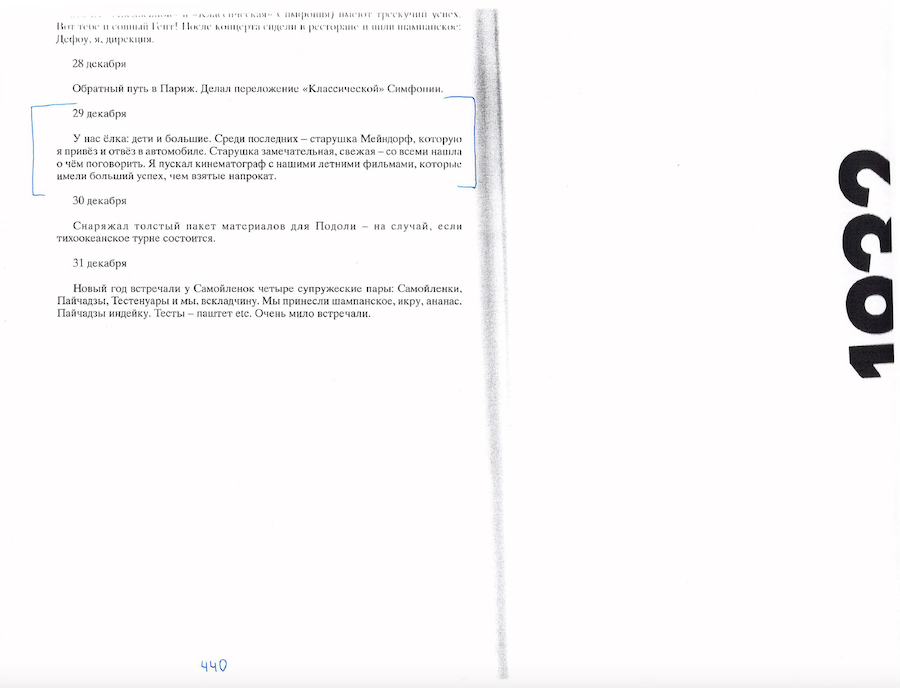
Citation
Prokofiev, Sergei. “Sergei Prokofiev in/at the Movies: Diary Notes and One Letter (1930).” Translated by Maria Vinogradova. In “Launching a Global Movement: Writings on Amateur Cinema, 1913-1943,” Charles Tepperman, Masha Salazkina, and Nicholas Avedisian-Cohen, eds. The Amateur Movie Database. University of Calgary, 2024.